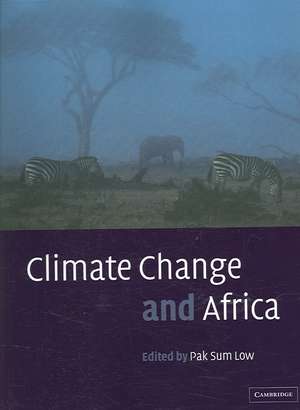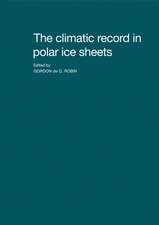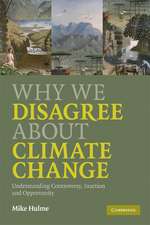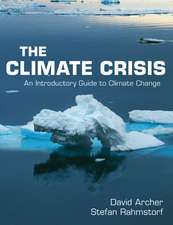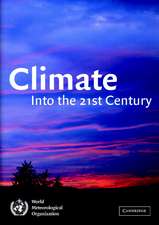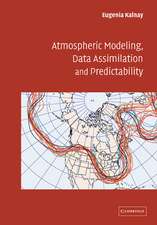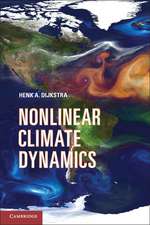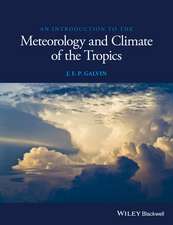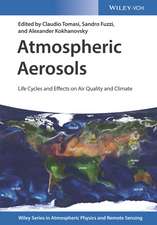Climate Change and Africa
Editat de Pak Sum Lowen Limba Engleză Paperback – noi 2006
Preț: 451.93 lei
Nou
Puncte Express: 678
Preț estimativ în valută:
86.47€ • 90.53$ • 71.55£
86.47€ • 90.53$ • 71.55£
Carte tipărită la comandă
Livrare economică 05-19 aprilie
Preluare comenzi: 021 569.72.76
Specificații
ISBN-13: 9780521029957
ISBN-10: 0521029953
Pagini: 412
Ilustrații: 108 b/w illus. 69 tables
Dimensiuni: 210 x 280 x 21 mm
Greutate: 0.92 kg
Editura: Cambridge University Press
Colecția Cambridge University Press
Locul publicării:Cambridge, United Kingdom
ISBN-10: 0521029953
Pagini: 412
Ilustrații: 108 b/w illus. 69 tables
Dimensiuni: 210 x 280 x 21 mm
Greutate: 0.92 kg
Editura: Cambridge University Press
Colecția Cambridge University Press
Locul publicării:Cambridge, United Kingdom
Cuprins
Notes on contributors; Peer reviewers; Editor's note; Forewords; Prefaces; Part I. Science: 1. Holocene climatic, hydrological and environmental oscillations in the tropics with special reference to Africa; 2. The relative importance of the different forcings on the environment in Ethiopia during the Holocene; 3. Global warming and African climate change: a reassessment; 4. Interactions of desertification and climate in Africa; 5. Africa's climate observed: perspectives on monitoring and management of floods, drought, and desertification; 6. Atmospheric chemistry in the tropics; 7. Natural and human-induced biomass burning in Africa: an important source for volatile organic compounds in the troposphere; 8. Biomass burning in Africa: role in atmospheric change and opportunities for emission mitigation; 9. Soil micro-organisms as controllers of trace gas emissions over southern Africa; Part II. Sustainable Energy Development, Mitigation and Policy: 10. Biomass energy in sub-Saharan Africa; 11. Natural resources: population growth and sustainable development in Africa; 12. Sustainable energy development and the Clean Development Mechanism: African priorities; 13. Opportunities for clean energy in the SADC under the UNFCCC: the case for the electricity and transport sectors; 14. Regional approaches to global climate change policy in sub-Saharan Africa; 15. Energy for development: solar home systems in Africa and global carbon emissions; 16. Climate change in sub-Saharan Africa: assumptions, realities and future investments; 17. Climate-friendly energy policies for Egypt's sustainable development; Part III. Vulnerability and Adaptation: 18. Potential impacts of sea-level rise on populations and agriculture; 19. Sea-level rise and coastal biodiversity in West Africa: a case study from Ghana; 20. The impacts of ENSO in Africa; 21. Climate policy implications of the recent ENSO events in a small island context; 22. El Niño causes dramatic outbreak of Paederus dermatitis in East Africa; 23. The role of indigenous plants in household adaptation to climate change: the Kenyan experience; 24. Requirements for integrated assessment modeling at the regional and national levels in Africa to address climate change; 25. Climate and disaster risk reduction in Africa; Part IV. Capacity-Building: 26. Climate change mitigation analysis in southern African countries: capacity enhancement in Botswana, Tanzania and Zambia; 27. Capacity-building initiatives to implement the climate change convention in Africa; 28. Education and public awareness: foundations of energy efficiency; Part V. Lessons from the Montreal Protocol: 29. Lessons for developing countries from the ozone agreements; 30. Opportunities for Africa to integrate climate protection in economic development policy; 31. Ozone depletion and global climate change: is the Montreal Protocol a good model for responding to climate change?; Index.
Recenzii
'He should be commended for managing to recruit about 40 per cent of the authors from Africa, giving the book for the most part a genuine African perspective… The collection of papers in this book addresses many aspects of climate change, providing an overview of the long-term trends, causes, consequences, development issues and opportunities, as well as offering detailed recommendations for maximising the progress to be made in Africa through Kyoto Protocol initiatives … the book remains a valuable resource for students and policy-makers in providing a fairly comprehensive overview of the range of issues that are linked to climate change mitigation and adaptation in Africa.' Area
Descriere
An invaluable reference for all researchers and policy makers with an interest in climate change and Africa.
